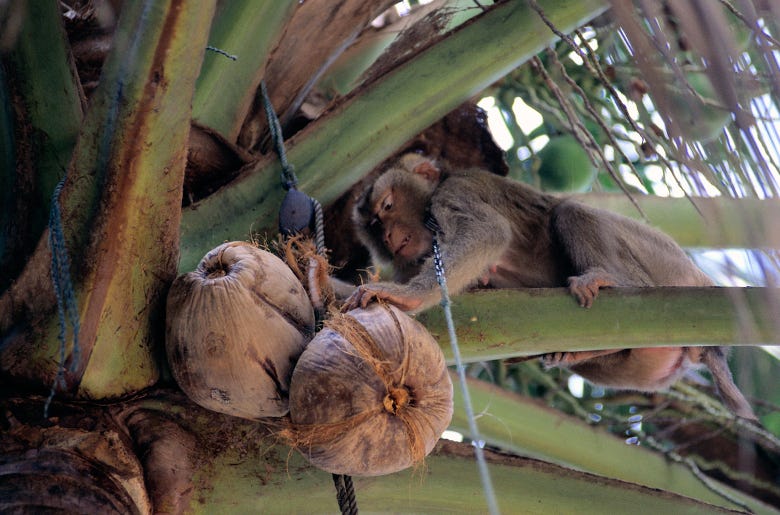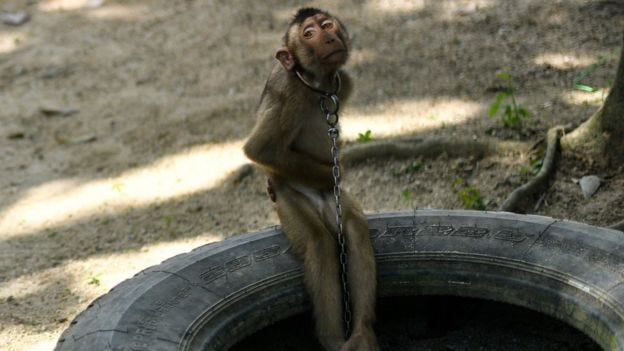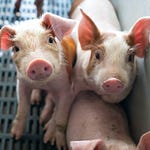From traditional body lotions, soaps, and household cleaning products to cheeses, butters, and veggie burgers, coconuts and their various derivatives (including coconut water, coconut oil, and coconut milk) are everywhere. Coconut-based ingredients can be found in almost all shampoos and conditioners, most cosmetics and household products, and many foods.
They are especially prevalent in vegan foods. In 2020, the number of plant-based products increased 14% over the previous year. Growth of meat alternatives “is projected to increase from $4.6 billion in 2018 to a whopping $85 billion in 2030,” but that will pale in comparison to dairy alternatives, which are “estimated to dominate the overall plant-based products market.”
Driving this growth is concern about animal cruelty. Yet in an ironic tragedy, the majority of new vegan foods contain coconut-derived ingredients, substituting one form of animal cruelty for another as the majority of coconuts sold across the world come from countries like Thailand, Indonesia, and Malaysia, where they are picked by primates.
Agile and adept climbers, pig-tailed macaques are acquired as infants by farmers. They are chained at the neck and trained to climb trees to pick coconuts. They are beaten regularly, worked to exhaustion, fed non-nutritious food, and deprived of socialization with their kind. They suffer from PTSD and frequently engage in self-mutilating behavior. When they become old and outlive their usefulness — suffering from mental illness, missing teeth, and unable to forage for food or protect themselves from predators — they are left in the wild to die.
My wife and I first found out about this industry of abuse almost 10 years ago. We were doing research for one of our cookbooks that included a discussion of a similar issue: how animals are harmed in the production of palm oil. Rainforests are frequently clear-cut to make way for palm plantations, leading to habitat loss for Asian elephants, tigers, rhinoceroses, and orangutans. But even worse is the fate suffered by those animals who are found eating palm fruit on these plantations. They are shot, beaten to death, and even set on fire.
Our solution was to replace palm oil with coconut oil in all our recipes. But first we did our due diligence to see whether coconut production was any better. Unfortunately, we could find little information about animal welfare practices. Not a single animal rights or animal protection group in the U.S. was addressing this issue — perhaps out of ignorance or perhaps because coconuts are so central to contemporary plant-based foods. There were no articles about it in mainstream publications, either.
Through painstaking research, we started to uncover evidence of horrible abuse far worse than anything we had previously imagined. We started writing about it on social media, in blogs, in our newly published cookbook, and, eventually, in an article for The Huffington Post.
After that well-circulated article, others began to notice, including mainstream news publications like The Washington Post, NPR, and the BBC. Eventually, this led to public figures speaking out on the issue; the boycott of Thailand coconut products by companies such as Costco; and the recent study by a team headed by an Oxford researcher.
When we first found out about the issue, we wrote to companies to ask about the harvesting of the coconuts used in their products. We were naive. Instead of asking them what country they sourced their coconuts from, we asked them if their suppliers used primate labor. Almost every company we reached out to claimed they were primate-labor free — except a few, such as Beyond Meat, that simply ignored our requests or told us it was “proprietary information.” But since many of these companies sourced from countries like Thailand, the confident, casual assurances were dubious. Coconut industry spokesmen admit that such a claim is “hard to believe” given the prevalence of monkey labor in these countries, where macaques pick upwards of “99 percent of the Thai coconuts.”
Thankfully, others are not being naive either. When Costco announced they “do not support the use of monkeys for harvesting” and will, therefore, no longer sell coconut products from Thailand, they too rejected vague assurances of compliance, opting for onsite review of supplier farms.
In response, some farmers have been forced to admit that they do use primate labor, but claim that the macaques are treated well. “It is always relaxed, no shouting, no punishing,” said one monkey trainer. “Every few trees the monkey hugs his owner… and the monkey gets a massage. Outside working hours the monkeys are kept as a pet…” Of course, this is a lie.
The new study in the Journal of Applied Animal Behaviour Science — conducted onsite in Thailand — proves it.
The authors of the study found that, “Coconut harvesting using northern and southern pig-tailed macaques occurs throughout Thailand, Malaysia, and Indonesia” even though both species are “globally threatened, with decreasing populations.” The macaques are taken from the wild when very young in one of two ways: “by either baiting a wooden box or shooting the mother.” All the macaques are trained by “punishment using tight leashes and whips.” They are worked as much as eight hours every day to the point “of exhaustion” during which “they harvest between 500 and 1000 coconuts.” Their diet “was comprised mostly of inappropriate processed foods.”
Roughly 90% of them showed fear and distress just from being observed by the researchers. “A majority of macaques showed signs of abnormal repetitive behavior” including “pacing,” “self-biting,” “self-clasping,” “hair-plucking,” “self-masterbating,” and “repetitively back-flipping.”
This extreme fear, manifesting as aggression, is dealt with by “yanking the leash,” “shouting commands,” as well as “physically beating” them repeatedly. Researchers “did not observe a single case of positive reinforcement (reinforcing desirable behaviours by administering rewards).”
To prevent biting, some farmers pull out the macaques’ canine teeth. Although the study did not go into the exact process of teeth removal, generally, monkeys caught for human use such as in the pet trade have their teeth pulled out with pliers or nail clippers without anesthesia.
Not surprisingly, the macaques had “extremely poor welfare,” “no behaviours directly indicating a positive mental state were observed,” and many suffered from “mental illness symptoms including PTSD.”
When not working, not a single macaque was “provided with enrichment” and 99% of them “were tethered on a leash consisting of a metal ring around the neck with either a rope or chain attached that allowed limited movement.” Leashes were short, less than three feet, and none were allowed socialization or contact with their fellow primates:
For highly social animals like pig-tailed macaques, the absence of normal social interactions during infancy (i.e. grooming, play, and asserting/accepting dominance displays) often leads to an increase in self-directed aggression, aggression directed towards others, and the inability to behave normally in social situations. Depriving young macaques of social interactions during this critical learning period inhibits the development of skills necessary to survive independently.
And yet when they get older and are no longer efficient at picking coconuts, they are abandoned in the wild, even though they do not know how to take care of themselves or to forage for food and may be missing canine teeth they need both to defend themselves from predators and to eat natural foods. They are simply left to starve.
It is, in a word, slavery.
The study, “Assessing the welfare of coconut-harvesting macaques in Thailand,” is here.
For more information, what you can do, and a list of common but obscure coconut ingredient names such as cocamidopropyl betaine and vegetable glycerine, click here.
















Did an abused monkey pick your coconut?